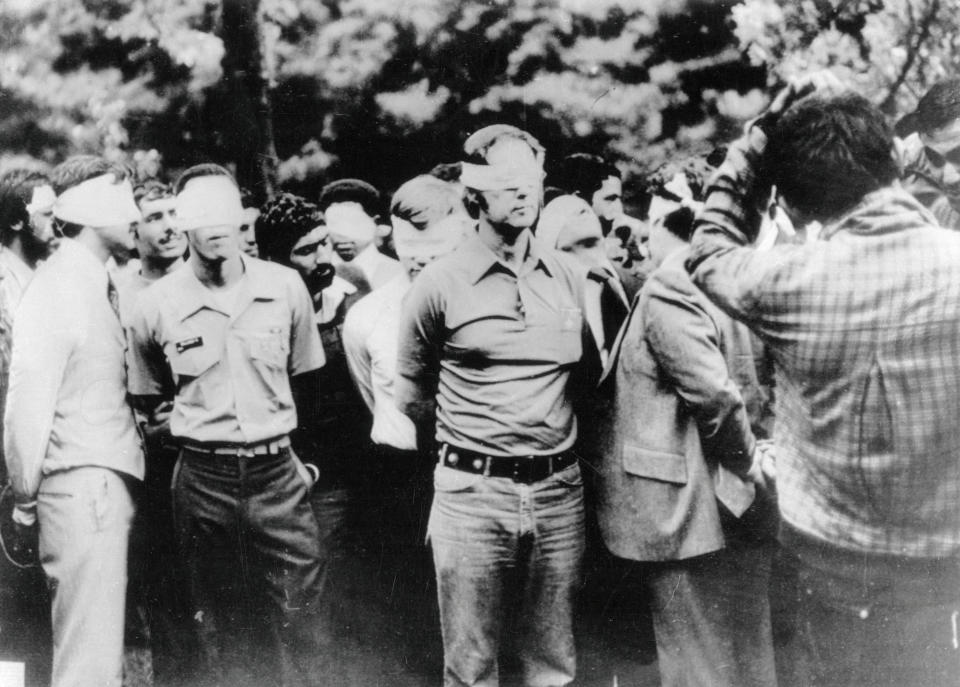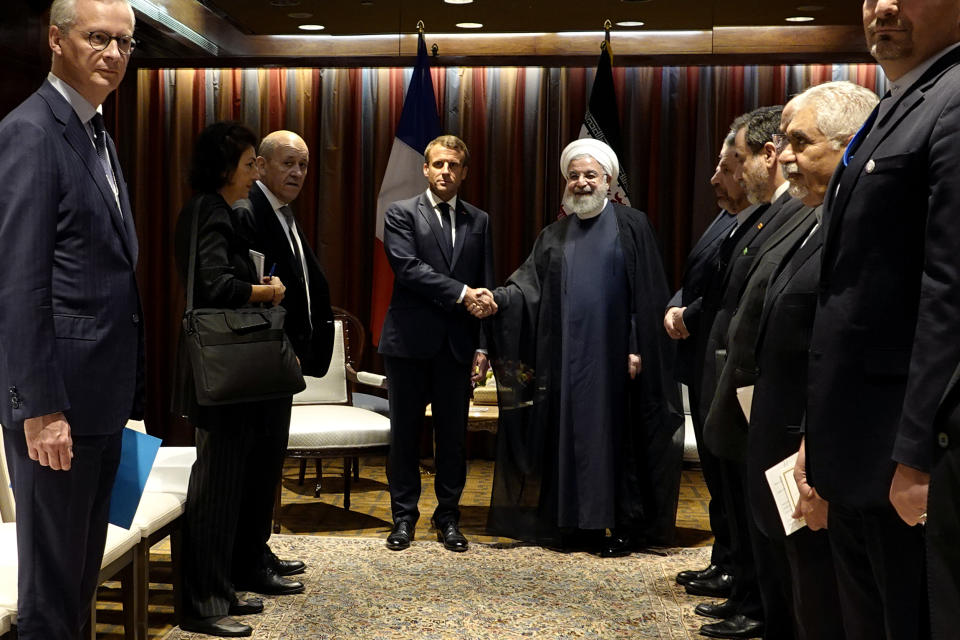The backchannel: Here's how the United States and Iran communicate
Hours after a U.S. drone strike killed Islamic Revolutionary Guard Corps Quds Force Maj. Gen. Qassem Soleimani, Washington sent a message to Tehran through the Swiss Embassy urging the Iranians not to escalate.
The exchange, first reported in the Wall Street Journal days later, one of several missives, was part of a longtime backchannel communication that allows the two countries to communicate in the absence of formal diplomatic relations.
“The diplomatic communication channel between [the] U.S. and Iran that is provided by Switzerland in the framework of the protective power mandate continues to operate,” a Swiss Ministry of Foreign Affairs spokesperson said in an email to Yahoo News. “Switzerland confirms that several messages were transmitted through this channel.”

Switzerland’s role as a diplomatic backchannel dates back to the 19th century — specifically, during the Franco-Prussian War of 1870-1871. Switzerland then acted as what’s known as a protective power for the first time, looking after the interests of both the Kingdom of Bavaria and the Grand Duchy of Baden in France.
A century and a half later, Switzerland was once again carrying out the mandate of protective power. This time, however, it was for the United States in Iran. The United States has not itself had diplomatic relations with Iran since the hostage crisis that began in 1979, when Iran declared itself an Islamic republic and a number of U.S. diplomats were taken hostage in the American Embassy.

A protective power serves as a go-between for two countries that have broken off relations. The Czech Republic plays the role for the United States in Syria; Sweden, in North Korea; but it is the Swiss who are tasked with carrying out the mandate for the United States in Iran.
That role has changed over the years. At present, it means trying to quietly de-escalate a tense situation between Washington and Tehran, a task in which Switzerland is backed by other, unofficial backchannels.
The Swiss as protective power are arguably now in the limelight in a way they haven’t been since the administration of George W. Bush. In 2003, the Iranians sent a message to the Americans via the Swiss that was essentially a proposal for comprehensive talks, which would have potentially included Tehran’s recognition of Israel and action against those terror groups that operate in Iran.
When, four years later, the document came to light, a Bush State Department official dismissed it, saying, “This document did not come through official channels but rather was a creative exercise on the part of the Swiss ambassador.”
John Bolton, who was at the time U.S. undersecretary of state for arms control, said years later, “I read it and I said, ‘This is Looney Tunes.’” He also said that he told Colin Powell, who was at the time secretary of state, to remove Tim Guldimann, a Swiss diplomat, from the position of head of the U.S. interests section at the Swiss Embassy in Tehran. Guldimann transmitted the message and was accused by U.S. officials of having created it.

In an interview with this reporter in 2018, Guldimann said he was the messenger, not the creator. He described his role in the Swiss backchannel as that of a “postman” delivering messages between the United States and Iran.
“Whenever there is something from one side, one side wants the other side to know, it uses this channel. And the mandate concerns merely being the postman,” he said.
President Barack Obama was later criticized for not pursuing a more comprehensive option, like the one presented in Guldimann’s message, and instead focusing on the nuclear component of the relationship.
At the time, though, it caused a diplomatic brouhaha, and broke the rule that protective powers should be heard and not seen. The Swiss diplomats tasked with maintaining the backchannel took a more low-key role in the years that followed.
But Switzerland is not the only country to serve as a backchannel, though it is the officially recognized one. Other countries in the Middle East and Europe have played their own parts, either in setting the stage or attempting to create the conditions for U.S.-Iran deliberations.
“There has never been any shortage of players seeking to broker talks between the U.S. and Iran, to complement the official Swiss channel,” Ambassador Bill Burns, a former deputy secretary of state, wrote in an email to Yahoo News. “The Omanis played a crucial role in facilitating the quiet direct discussions that opened the door to the nuclear agreement. More recently, the French and Japanese have tried to help.”
Oman hosted the first talks between the United States and Iran in the discussions that preceded the nuclear deal. What Oman’s role will look like after the recent death of its longtime leader, Sultan Qaboos bin Said Al Said, is as yet unclear. His chosen successor, Haitham bin Tariq Al Said, has pledged to continue friendly relations with all nations, which suggests it will continue to play a role between the United States and Iran.
France is reportedly looking to take on a more prominent role in navigating the ever-choppy waters of U.S.-Iran relations.
“In the wake of the Soleimani killing, Macron has spoken to a large number of world leaders to try to keep the diplomatic option on the table,” Benjamin Haddad, a former representative of French President Emmanuel Macron’s En Marche movement, wrote in an email. “He is still hoping to appeal to Trump’s pragmatic business personality to broker dialogue.”
“Besides,” he continued, “France is the European country with the most troops in Iraq in the coalition against ISIS, a fact that bolsters Paris’s position with Trump as he asks NATO to step up against terrorism.”

Haddad, who is now at the Atlantic Council, also noted that France was acting as something of a coordinator for European countries, working with Britain and Germany in particular, to reaffirm their commitment to the Iran nuclear deal. Trump has called on European countries to join him in putting maximum pressure on Iran, while Tehran says it no longer needs to abide by any limits of the nuclear deal.
“France has shared U.S. concerns over Iranian destabilizing regional activities and has proposed broadening a deal to ballistic missiles, terrorism and regional interference,” Haddad wrote, adding that Macron had proposed this during his April 2018 state visit to Washington one month before Trump pulled out of the nuclear deal.
It could be that the latest sequence of events provides an opening for diplomacy, “but that is now up to Washington and Tehran,” Haddad wrote. “Paris can provide a framework, but it is up to Washington and Tehran to use it.”
In the end, the main challenge isn’t about finding a specific channel, Burns wrote, “but what both sides are prepared to talk about, and whether they’re serious about deescalating.”
_____
Read more from Yahoo News:
Did the U.S. 'assassinate' Iranian general or just kill him? Why it matters
Saudis warn of new destructive cyberattack that experts tie to Iran
Your Democratic primary cheat sheet: In the run-up to Iowa, who's still in the race?
PHOTOS: Ukraine International Airlines plane crashes in Iran killing all on board


